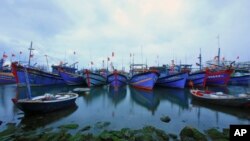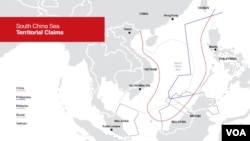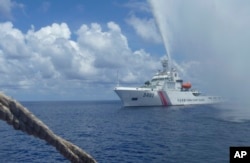China’s plan to declare an unusually strict fishing moratorium in the contested South China Sea this year threatens to shake relations with its neighbors, despite dialogue in recent months, and might violate a 2016 world arbitration court ruling, experts say.
The Chinese Ministry of Agriculture said in February it would impose its strictest fishing moratorium in May to protect stocks. The moratorium will cover the South China Sea south to the 12th parallel, lopping off waters claimed by Taiwan, Vietnam and the Philippines.
Beijing has enforced past South China Sea fishing moratoriums, the first of which was announced in 1995, by seizing fishing boats. If it does that again, it risks losing improved relations with Vietnam and the Philippines, analysts say.
Other nations not consulted
“China has announced a fishing moratorium without consulting the other claimant nations, which have substantial fishing interests in the South China Sea,” said Fabrizio Bozzato, an associate researcher specializing in international affairs at Tamkang University in Taiwan.
“It would be a completely different story if China had consulted states like Vietnam or the Philippines to implement a coordinated fishing moratorium,” he said. “The message that Beijing intends to convey is that the South China Sea is an entirely Chinese Sea and China has exclusive rights to its resources.”
Taiwan normally stays quiet in the dispute, but Vietnam and the Philippines are more outspoken about China’s maritime expansion, including landfill and military installations on disputed islets.
Neither country is likely to acknowledge the Chinese moratorium, letting individual boat operators decide whether to violate it, said Termsak Chalermpalanupap, a fellow with the ISEAS Yusof Ihsak Institute in Singapore.
“It depends on the local fishing people, whether they want to risk being arrested by the Chinese coast guard,” he said. “They have been arrested many times.”
The Philippine government will probably avoid advising fishing boats to shun the moratorium zone because any warning would sound like a concession to China, said Herman Kraft, political scientist at University of the Philippines Diliman.
“If there is very aggressive harassment, then it’s just like what happened at Scarborough Shoal before,” Kraft said, referring to a disputed islet northwest of Manila that Chinese boats occupied in 2012. “There will be probably a lessening of the presence of Philippine fishermen going to these areas.”
Ruling violated
Philippine President Rodrigo Duterte broke ranks with his predecessor in October by meeting his Beijing counterpart to explore joint uses of the disputed sea. Senior Chinese and Vietnamese officials have met since September to look into maritime cooperation.
But Beijing’s moratorium threatens the thaw in China-Philippines ties, said the U.S.-based Lawfare Institute in a March 7 commentary.
Vietnam will protest but probably not encourage their fishermen to challenge the moratorium, said Zhang Hongzhou, research fellow with the China Program at the S. Rajaratnam School of International Studies at Nanyang Technological University in Singapore.
China’s moratorium also violates an arbitration tribunal ruling by the World Court in The Hague, some analysts say. The July 2016 verdict sought by Manila said a similar Chinese moratorium in 2012 ignored the Philippines’ rights to manage marine life in its ocean exclusive economic zone of 200 nautical miles (370 kilometers) offshore.
“Maybe the challenge by the littoral states can be more vigorous because of the arbitral tribunal ruling that China actually has no legal basis to claim control of many disputed areas,” Chalermpalanupap said.
But fishing moratoriums also help China assert legal control of disputed areas, he added. Chinese officials have strongly rejected the World Court ruling.
China would be “fulfilling its duty” under the United Nations Law of the Sea through controls against overfishing, Zhang said.
The sea yields 16.6 million tons of fish every year and the fishing industry employs about 3.7 million people, according to a National Geographic report in mid-2016, but stocks are declining after decades of use.
But exclusive economic zones delineated by each country are unsettled and the boundaries of China’s nine-dash claim to most of the sea “remain unclear,” Zhang said.
The moratorium this year will last through mid-August, a month longer than before, and restrict more types of fishing operations, the official People’s Daily reported. Only bait and tackle fishing will be allowed, the Lawfare Institute commentary said, and the moratorium makes no mention of fishermen’s nationalities.
Beijing claims most of the 3.5 million-square-kilometer South China Sea. Brunei and Malaysia contest some tracts of water with China, but the ocean economic zones of both are located south of the 2017 moratorium line.






